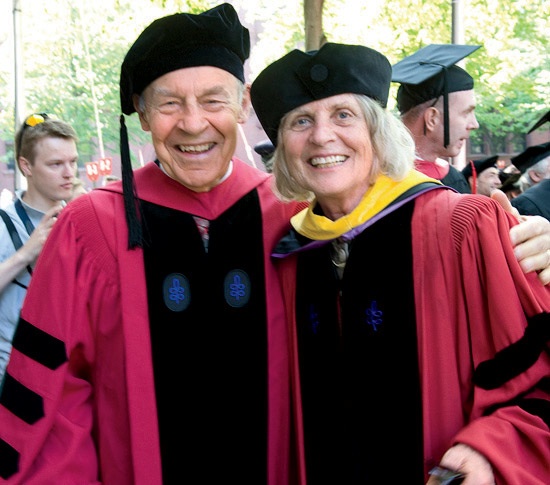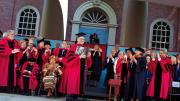Amid Harvard’s vast Commencement spectacle, the formal center—on the dais constructed beside Memorial Church—is still the venue for small gestures that go to the heart of the University and its people. Herewith, a close reading of some 2011 events not prescribed by the “Form of Conferring Degrees” that guides the morning exercises and the people who conduct the business of graduation.
Between the awarding of student degrees and the bestowal of honorary ones, President Drew Faust interrupted the proceedings, saying, “Before we continue, let me take this opportunity to recognize the man standing at the microphone. Steve Hyman will step down this June after a decade of extraordinarily distinguished and devoted service as the provost of the University. All of us who care about Harvard owe him our gratitude. Please join me in applauding and thanking him.” Hyman received an especially vigorous ovation from the party on the stage: the deans, Fellows, and Overseers who have worked most closely with him. Faust then presumably returned to the formal script for the honorands, but injected a spontaneous phrase: “The provost—if he’s able to speak—will introduce the candidates.” Hyman instantly picked up the baton: “Ah, now back to regular business.”
James R. Houghton, recognized for helping guide the University’s passage “through change and through storm” (including the end of Lawrence H. Summers’s presidency, the transition to Faust’s, and the financial crisis) in his honorary citation—the valedictory for a lifelong engagement with Harvard—blew the president a kiss upon receiving his degree.

Photograph by Jim Harrison
Harvard partners Dudley and Georgene Herschbach
Harvard hands especially appreciated the provost’s description of honorand Dudley R. Herschbach as “an engaged citizen of the University” and “no stranger to this ceremony” (for which he provided broadcast commentary for many years—an atypical role for a Nobel laureate). So it was particularly apt that his escort for the day was his wife, longtime Harvard administrator Georgene Herschbach (the couple together served as master and co-master, respectively, of Currier House in the 1980s), rather than the customary faculty member with expertise in the same field.
As the exercises ended and the entire assembly rose in song, Plácido Domingo, freshly anointed Doctor of Music, master of more than 130 different operatic roles, in more than 3,500 performances, scrutinized the program, trying to keep up with the Latin lyrics of the “Harvard Hymn.”









